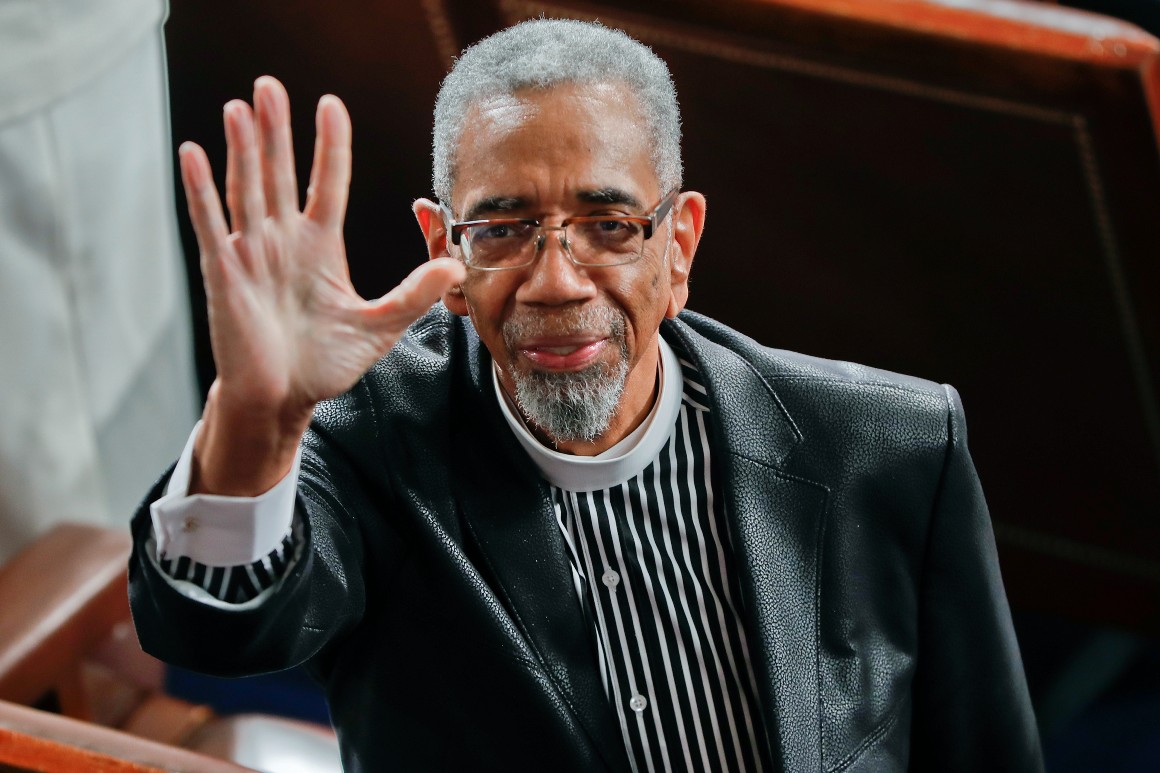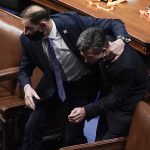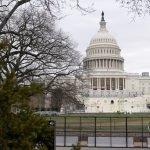Illinois Rep. Bobby Rush, the longtime Civil Rights activist first elected to Congress in 1992, won’t seek reelection in November, he told POLITICO on Monday.
Rush, a legend in Chicago politics dating back to the 1960s when he co-founded the Illinois Black Panther Party, joins a wave of House lawmakers leaving public office.
Just don’t call it a retirement.
“First of all, I’m not retiring man, alright?" he said in an interview. "I am not ready to go off to some spot in the sun, sit on nobody’s beach drinking tequila."
His plan: to focus on his work as a pastor, where he hopes to maintain sway over voters who sent him to Congress 30 years ago. "I’m coming home to my church located in the heart of South Side of the city of Chicago," Rush said, referring to the Beloved Community Church of God in Christ, where he serves as pastor.
“I’m just entering into a new level of my life," he said.
The veteran lawmaker who went from fist-raising militant to a mainstream, albeit left-leaning, congressman will announce his plans on Tuesday at the Roberts Temple Church of God in Christ, the revered Chicago location of the 1955 funeral of 14-year-old Emmett Till. The announcement location is symbolic as Rush hopes to get the Emmett Till Antilynching bill signed into law this year.
Rush has introduced the measure, which would designate lynching a federal crime, several times — including exactly a year ago Tuesday. The bill has been approved by the House Judiciary Committee this Congress, but has not been taken up by the full House or Senate.
The prospect of Democrats losing the House did not influence his decision, he said.
“Oh, absolutely not,” Rush said. “I don’t accept that. I don’t believe in Ouija boards, I don’t believe in forecasting the future — none of that. I think Democrats are in prime position to retake the house and increase their numbers in the Senate.”
Rush’s 1st District, which encompasses much of Chicago’s South Side, would remain in Democratic hands, so his exit won’t cut into the party’s shaky hold on the House. But Rush’s announcement is shaking up Chicago’s political landscape, with numerous Illinois politicos already putting out feelers that they’re interested in replacing him.
"I am sure it was not an easy decision when he has given so many years of his life to the First District," Rep. Robin Kelly, who heads the Illinois Democratic Party, wrote in a text message. "I am a little surprised, but I wish him the very best as he starts another chapter."
Rush has been an advocate against gun violence long before the issue became today’s center of discussion. His crusade started after the police killings of Black Panthers’ Fred Hampton (whom Rush recruited) and Mark Clark, but 30 years later, it became even more personal. His son, Huey Rich, was killed in an armed robbery on the city’s South Side.
Before Capitol Hill, Rush served on Chicago’s City Council and was a leader in the state’s Democratic Party, becoming a close ally of former House Speaker Michael Madigan. In 1999, he ran for mayor, losing to then-incumbent Mayor Richard M. Daley.
Rush has seen his share of political challengers over the years, including Barack Obama, who was famously bested in a primary by Rush in 2000 — 61 percent to 30 percent. The victory is legend in Chicago political circles as the only race Obama ever lost. The future president described that Democratic primary loss as getting “my rear end handed to me.” And Rush savored it.
The veteran lawmaker was expected to ease into another victory this year, but he had yet to officially announce. In October, he told POLITICO, “What’s the hurry? I’ll announce in January.” And last month, he told POLITICO’s The Recast, “I’m going to be an activist as long as I’m here in the land of the living. … I can’t even imagine myself retiring into some kind of easy chair.”
Rush has his share of congressional accomplishments. He helped secure passage of the Civil Rights Cold Case Records Collection Act in 2019 to increase public access to cold-case records and to help bring closure to families.
He also offered and secured passage of an amendment for fiscal 2020 to increase funding by $2 million for the Debbie Smith DNA Backlog Grant Program to help clear rape kit backlogs. He was inspired to do so in light of the disturbing number of missing Black women and girls in Chicago and around the country.
Rush also addressed nuts and bolts issues related to consumer product safety, and he serves on the House Energy and Commerce Committee, where he’s focused on energy and environmental justice issues.
He plans to keep pushing through legislation until the end, he said, including the Emmett Till Antilynching Act and the COINTELPRO Full Disclosure Act, a bill introduce in May that would open up a files from an FBI counterintelligence program that surveilled Black communities.
“Let’s see how many Americans did J. Edgar Hoover have killed,” Rush said in a recorded video that he plans to play during his Tuesday announcement.
“I want to get those files exposed, but I also want to get J. Edgar Hoover’s name off the federal building, the FBI headquarters in Washington, D.C.,” Rush said in the video.
As for his successor, “I will be making a suggestion,” Rush said. “I’m going to be presenting an individual who I would like to continue the work that I have done in the U.S. Congress.”
But will that be happening on Tuesday? Don’t bet on it.
“No it won’t come tomorrow,” Rush said with a deep chuckle. “One of the things I’ve learned about the media is you don’t step on your message.”





















